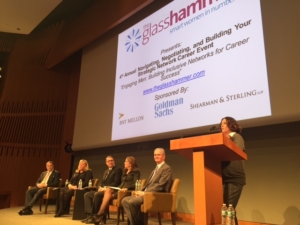 After the financial crash in 2008, many law firms were forced to downsize, combine or dissolve. Unlike after prior market constrictions, the numbers of lawyers hired by firms have not rebounded and this past year law school enrollment was the lowest it had been in 40 years. What does this mean for newly admitted attorneys and experienced attorneys? And how does pro bono fit in to the picture?
After the financial crash in 2008, many law firms were forced to downsize, combine or dissolve. Unlike after prior market constrictions, the numbers of lawyers hired by firms have not rebounded and this past year law school enrollment was the lowest it had been in 40 years. What does this mean for newly admitted attorneys and experienced attorneys? And how does pro bono fit in to the picture?
The American Bar Association Model Rules of Professional Conduct encourages all attorneys to seek to offer 50 hours of pro-bono service a year. As a result, many state bars have adopted these rules because they recognize the importance of pro bono service. Most attorneys recognize the importance of giving back particularly when many people cannot afford an attorney and often appear in court unrepresented. But beyond these altruistic and aspirational reasons, there are also unintended benefits to those who donate their time — helping others can mean helping yourself too.
A. Developing Your Skill Set
One of the most common complaints from clients about newly admitted lawyers is that they don’t graduate with a lot of practical skills. Additionally, in a constricted economy, many clients are no longer interested in footing the bill for on-the-job training. Pro bono assignments and representations can provide an excellent source of practical training for the newly minted attorney and a means of learning specific legal skills. Such cases often give new attorneys a rare opportunity to meet directly with a client. You will learn how to interview to discover what the client’s legal issues are and what the client hopes to achieve from your representation. You will also learn how to effectively communicate with the client to help them achieve those goals. You may also hone your drafting and negotiation skills. But a pro bono representation should not be undertaken lightly. In order to maximize your learning curve and ensure you can effectively represent your client, proper training in representing the pro bono client is necessary and invaluable.
Many non-profit organizations seeking pro bono volunteers offer training for volunteer attorneys. One of PLI’s very important initiatives is the offering of such pro bono training. We have collaborated with hundreds of legal aid and pro bono entities to develop a curriculum of free programs in practice areas critical to the representation of low-income clients – including housing, family law, government benefits, immigration, veterans’ issues, and more – to train legal services attorneys and attorneys in private practice to take on a pro bono representation. It’s particularly rewarding to learn from participants how valuable our programs have been for projects and roles they have taken on as a result. The best of part of providing pro bono training is knowing that we’ve given attendees the knowledge and tools to make a difference.
B. Learning About New Areas of Law
A benefit for both newly admitted attorneys and more experienced attorneys alike is the chance to explore new areas of the law. In taking on a case in an area outside of your usual practice area you can gain substantive knowledge about new areas of law – immigration, bankruptcy, wills, divorce, veterans’ rights, non-profit incorporations, criminal appeals – the possibilities and opportunities are endless. Indeed, attendees from our many programs have written to share how our program has “sparked interest in helping foster children”; will be used “in helping sick or injured children”; and was “inspiring — led me to contact Legal Aid regarding a pro bono housing case.”
Who knows — you may just discover a passion for a new area of the law that leads you to a new career. At the very least, you will have learned something new and this knowledge might benefit another client, or possibly even a friend or family member down the line.
C. Networking
Another not so obvious benefit to pro bono service is networking. Many law firm clients expect the firms they hire to engage in pro bono work. While doing pro bono work might help you stand out from the pack in the eyes of the client, it will also expand your professional universe. A likely scenario is that through the course of your training and pro bono service you will come in contact with other volunteers, individuals at the non-profits, and maybe even firm clients – and these connections will help you build and expand your professional network. Indeed, an attendee of one of our free training webcasts shared the following story with me. He was between jobs and looking to do some pro bono work. He reached out reluctantly to PLI for a scholarship, a bit torn about admitting he needed the financial help. While watching one of our webcasts, a colleague walked by, asked about the program and his experience, ended up taking him to lunch and retaining him for work. He was so thrilled with the outcome of this scholarship he wrote to thank PLI profusely.
While not everyone will gain a job from their pro bono training there are unintended professional benefits to be had through pro bono service that all attorneys should consider. And there are also the intended benefits – the joy and pride in helping someone in need who otherwise wouldn’t be able to afford an attorney.
*Anita Carr Shapiro is the President of the Practising Law Institute (PLI), the premier continuing legal and professional education organization. She is PLI’s fifth President since 1933, and its first female president.
By Anita Carr Shapiro
Guest advice and opinions not necessarily those of theglasshammer.com





